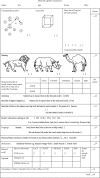Early Cognitive Dysfunction in Elderly Patients after Total Knee Arthroplasty: An Analysis of Risk Factors and Cognitive Functional Levels
- PMID: 35224095
- PMCID: PMC8881138
- DOI: 10.1155/2022/5372603
Early Cognitive Dysfunction in Elderly Patients after Total Knee Arthroplasty: An Analysis of Risk Factors and Cognitive Functional Levels
Abstract
Background: Cognitive dysfunction after total knee arthroplasty (TKA) is very common in elderly patients. Postoperative cognitive dysfunction (POCD), as a form of cognitive dysfunction, may affect patients' short- and long-term recoveries. The identification of meaningful risk factors may help reduce the occurrence of POCD in the future.
Objective: Our goal was to retrospectively investigate the risk factors for early POCD in elderly patients undergoing TKA and to further analyze the relationship between the intensity of risk factors and the level of cognitive function.
Methods: The related indicators and the Montreal Cognitive Function Assessment Scale (MOCA) scores of 105 elderly patients were collected by searching the electronic case system. According to the postoperative MOCA score, patients were divided into three groups: normal group (group N), mild POCD group (group M), and severe POCD group (group S). SPSS 25.0 software was used for statistical analyses.
Results: At baseline, the preoperative MOCA score was significantly different in patients with POCD (P ≤ 0.001), while other baseline indicators were not significantly different. In terms of changes in hemoglobin levels, statistically significant differences were observed between group M, group S, and group N (P = 0.039). Among inflammatory indicators, only postoperative CRP levels showed a statistically significant difference in patients with POCD (P = 0.041). Postoperative pain was also significantly different among the three groups (P = 0.009). The multivariate regression analysis revealed that a low preoperative MOCA score and severe postoperative pain were independent risk factors for mild and severe cognitive impairment, while a high postoperative CRP level was only an independent risk factor for mild cognitive impairment.
Conclusions: Our study found that the level of preoperative cognitive function, postoperative CRP level, and postoperative pain were independent risk factors for POCD. Moreover, the levels of preoperative cognitive function and postoperative pain were more strongly correlated with severe POCD than postoperative CRP levels.
Copyright © 2022 Shengjie Ren et al.
Conflict of interest statement
The authors have no conflicts of interest regarding the publication of this article to declare.
Figures
Similar articles
-
Serum Phosphorylated Neurofilament Heavy Subunit-H, a Potential Predictive Biomarker for Postoperative Cognitive Dysfunction in Elderly Subjects Undergoing Hip Joint Arthroplasty.J Arthroplasty. 2019 Aug;34(8):1602-1605. doi: 10.1016/j.arth.2019.03.073. Epub 2019 Apr 4. J Arthroplasty. 2019. PMID: 31029495
-
Postoperative cognitive dysfunction is rare after fast-track hip- and knee arthroplasty - But potentially related to opioid use.J Clin Anesth. 2019 Nov;57:80-86. doi: 10.1016/j.jclinane.2019.03.021. Epub 2019 Mar 28. J Clin Anesth. 2019. PMID: 30927698
-
Low preoperative estimated glomerular filtration rate level is a risk factor for postoperative cognitive dysfunction in elderly undergoing elective total hip replacement: a prospective observational study.Psychogeriatrics. 2025 Jan;25(1):e13238. doi: 10.1111/psyg.13238. Psychogeriatrics. 2025. PMID: 39754410
-
Postoperative cognitive dysfunction in elderly patients undergoing hip arthroplasty.Psychogeriatrics. 2020 Jul;20(4):501-509. doi: 10.1111/psyg.12516. Epub 2020 Jan 24. Psychogeriatrics. 2020. PMID: 31976614
-
Progress of research in postoperative cognitive dysfunction in cardiac surgery patients: A review article.Int J Surg. 2021 Nov;95:106163. doi: 10.1016/j.ijsu.2021.106163. Epub 2021 Nov 4. Int J Surg. 2021. PMID: 34743049
Cited by
-
Effects of different levels of controlled hypotension on regional cerebral oxygen saturation and postoperative cognitive function in patients undergoing total knee arthroplasty.Front Med (Lausanne). 2022 Sep 14;9:989341. doi: 10.3389/fmed.2022.989341. eCollection 2022. Front Med (Lausanne). 2022. PMID: 36186818 Free PMC article.
-
Fluoxetine for reducing postoperative cognitive dysfunction in elderly patients after total knee replacement: study protocol for a single-centre, double-blind, randomised, parallel-group, superiority, placebo-controlled trial.BMJ Open. 2022 Jun 28;12(6):e057000. doi: 10.1136/bmjopen-2021-057000. BMJ Open. 2022. PMID: 35768113 Free PMC article.
-
The Effects of Hyperlipidemia on Postoperative Cognitive Dysfunction in Patients Undergoing Laparoscopic Gynecological Tumor Surgery.Neuropsychiatr Dis Treat. 2025 Feb 13;21:259-269. doi: 10.2147/NDT.S506570. eCollection 2025. Neuropsychiatr Dis Treat. 2025. PMID: 39963123 Free PMC article.
-
Cognitive dysfunction in older patients undergoing non-neurosurgery in the immediate postoperative period: A systematic review.Nurs Open. 2024 Aug;11(8):e70023. doi: 10.1002/nop2.70023. Nurs Open. 2024. PMID: 39189543 Free PMC article.
-
Risk Factors for Postoperative Cognitive Decline After Orthopedic Surgery in Elderly Chinese Patients: A Retrospective Cohort Study.Clin Interv Aging. 2024 Mar 19;19:491-502. doi: 10.2147/CIA.S436349. eCollection 2024. Clin Interv Aging. 2024. PMID: 38525317 Free PMC article.
References
MeSH terms
LinkOut - more resources
Full Text Sources
Medical
Research Materials
Miscellaneous


